Field Trips
Subcategories
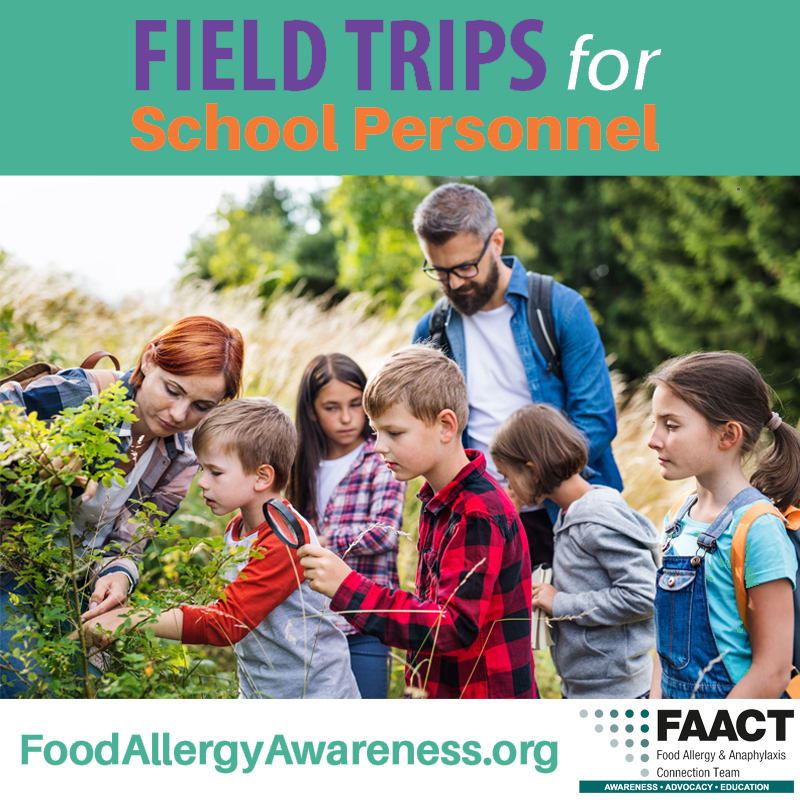
Field Trips for School Personnel
Field trip coordinators, chaperones/adults, and bus drivers should be prepared to deal with food allergies and respond to a student who may experience an anaphylactic reaction while travelling to and from school-related activities and on field trips. This pertains to students who have known allergies as well as students who may experience anaphylaxis for the first time without a history of allergic reactions.
A designated individual directly available to students with food allergies during school-sponsored events and on field trips should fully understand students’ food allergies and be confident in caring for these students, including recognizing the signs and symptoms of an allergic reaction, understanding students’ emergency action care plans, and knowing how to enact emergency procedures.
In planning for field trips, care should be taken to ensure a healthy and safe environment for all students, including students with food allergies. For example, a class should not visit a ranch where peanuts are fed to animals if a student has peanut allergy, and a class should avoid visiting an ice cream shop if students have a milk allergy. This does not mean that students with food allergies should be left behind. Trips should be planned that are inclusive of all students.
FAACTs
- There is no cure for food allergies. Strict avoidance of the food(s) is the only way to prevent a food allergy reaction from occurring.
- Every food allergy reaction has the possibility of developing into a life-threatening and potentially fatal allergic reaction.
Review FAACT's Best Practices for Field Trips below to assist in the planning for food allergies on field trips.
You may also visit FAACT’s Education Resource Center for additional tools and resources.
A list of suggested downloads are located at the bottom of this page.
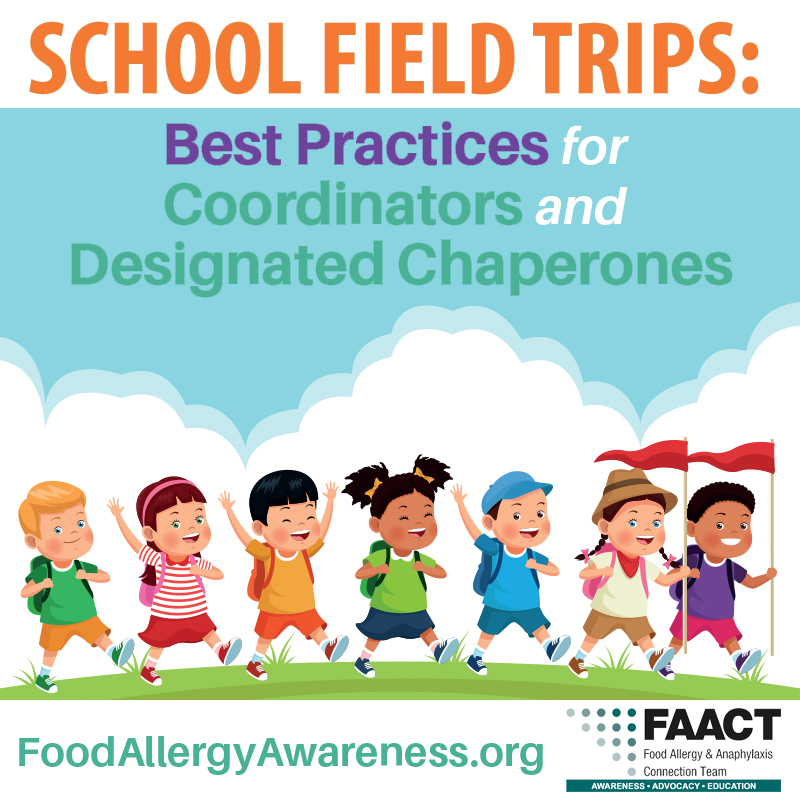
Best Practices for Coordinators and Designated Chaperones/Adults Include:
- Students with food allergies should participate in all school activities and must not be excluded based on their condition.
- Students should wear medical alert identification at all times.
- Encourage, but do not require, parents/guardians of food-allergic students to accompany their child on school trips.
- When planning for a field trip, the parents, school nurse, and field trip coordinators should collaborate to avoid high-risk destinations.
- If a trip includes an overnight stay at a hotel, request rooms with kitchens, refrigerators, and microwaves so food-allergic students can cook their own meals.
- Call all destination locations, including travel stops, restaurants, and hotels, ahead of time to ensure accommodations are available for student(s) with food allergies. Review emergency protocols with appropriate representatives from each of these locations.
- If a trip includes eating lunch outside at a park or picnic area, determine an alternate location in advance in the event of inclement weather.
- Designate the appropriate individual to work with the school nurse immediately prior to the trip to ensure all medications and instructions are packed.
- Identify for students and chaperones/other staff the trained individual(s) or the designated staff member(s) who will be carrying the student’s epinephrine products and other medications.
- Consider insect sting, medication, and latex allergies in addition to food allergies.
- Enforce a “No Food or Beverage Sharing” policy.
- Ensure backup batteries for cell phones and other emergency communication devices are available and in working order. Plan emergency procedures for areas in which cell phone reception may not be available.
- Enforce rules to wash hands before and after drinking/eating when possible (and use of disposable wipes otherwise).
- Participate in the school’s approach on how to manage students with food allergies.
- Understand how to directly communicate with the student’s parent(s) in the event of an emergency and ensure all designated adults have emergency contact numbers.
- Understand federal and state laws that protect the privacy and confidentiality of the student’s medical information and other legal rights of students with food allergies.
- How to report food allergy bullying or complaints from the student.
- Ensuring communication devices are in working order prior to each transport.
- Return all medication(s) to designated staff member or school nurse immediately upon returning from field trip.
Prepare for snack needs on long-haul trips:
- Notify all parents to avoid packing snack items that directly contain allergens.
- Require that snack/food items containing allergens remain wrapped until students are at their destination.
- Prepare allergy friendly snacks for all students and distribute them enroute. Consult with the school nurse and parent(s) of food-allergic students on approved snack items before to the trip.
- Provide disposable wipes to all students after eating snacks/meals.
Ensure you understand the role of the transportation staff while on field trips:
- Where the emergency action care plan is kept for each student
- Location of epinephrine auto-injectors and other emergency medication and how to administer it for each student.
Creating a safe environment for food-allergic students:
- FAACT's Cross-Contact section: Cleaning procedures
- Enforcing a "No Food or Beverages" policy (exception for children with a medical condition).
- Student placement on the bus (while limiting potential for social isolation).
FAACT Resources
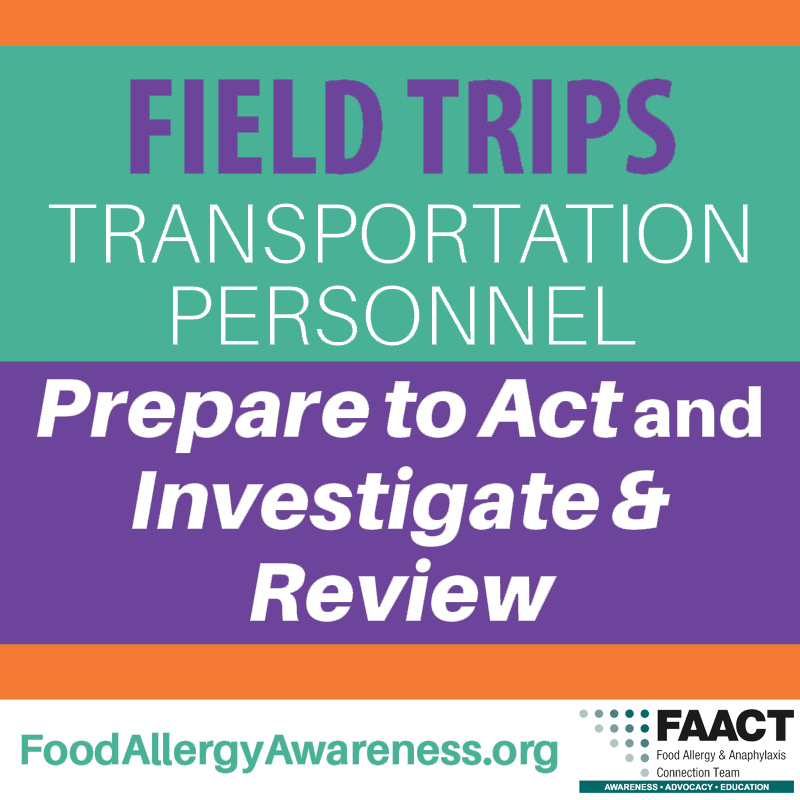
Prepare To Act
It is important that bus drivers and other transportation personnel prepare for and understand how to respond to a food allergy emergency.
Steps to take include:
- Ensure all bus drivers, bus attendants, and substitutes receive annual food allergy and anaphylaxis training.
- Learn how to recognize the signs and symptoms of an allergic reaction and anaphylaxis.
- Learn how to use all epinephrine auto-injector devices.
- Participate in semi-annual emergency drills.
- Act quickly; note student could be exposed prior to bus trip.
- Learn protocols and procedures for activating EMS.
- If an allergic reaction takes place, know the plan of action.
- Who is going to give epinephrine?
- Who is going to call 911 and by what method?
- Who is going to contact the parents? Where can these emergency numbers be located?
- Who is going to ride with the student to the hospital?
- Who is going to comfort and explain the situation to students on the bus and their parents
- Provide emergency communication device for each transport (cell phone, two-way radio, intercom, etc.), and require testing of the communication device prior to each transport.
- Does your route’s first responder carry epinephrine?
- Create and enforce policies that prohibit discrimination and bullying against all students, including those with food allergies.
- Create and maintain a bullying report procedure for students with life-threatening food allergies that allows the student to report bullying to school personnel and/or the Transportation Director.
- Create and maintain a policy for review after an emergency that includes the school administrators, school nurse, transportation staff, bus drivers, parents, EMS responders, staff members involved, the student, etc.
Investigate and Review
If an allergic reaction does take place on the school bus or while students are being transported in other ways, transportation personnel should:
- Attend the review meetings with parents, staff, and students.
- Review updates to the student’s Allergy & Anaphylaxis Emergency Plan and notify staff, aids, and substitute teachers.
- Confirm replacement of all emergency medications for the student(s).
Download FAACT's Bus Drivers and Transportation Personnel Handout
Download FAACT's Bus Drivers and Transportation Personnel Checklist
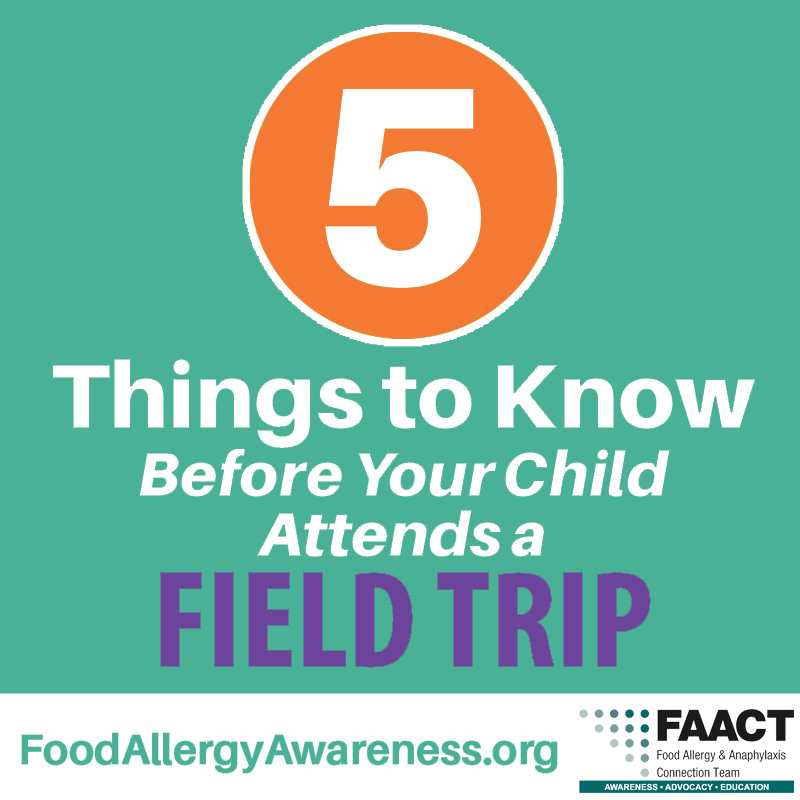
5 Things to Know Before Your Child Attends a Field Trip
If your child’s school is planning a field trip, be sure to find out the answers to these 5 things:
When, Where, How, What, and Who. By discussing these questions, you’ll help everyone prepare for the trip.
WHEN will they go?
- If your schedule allows, see if you can chaperone or if a family member (who understands food allergies) can attend with your child.
WHERE are they going?
- Is the location high-risk or allergen-free? Try to contact or visit the facility beforehand to find out the safety of the environment.
HOW are they getting to the location?
- If riding a bus, are there policies about no eating on the bus?
- Is it possible to have your child sit close to a teacher or aide, so they can watch over him or her?
WHAT will they be doing?
- Will the students be around food? Check if the activities involve food or treats.
- Will they be making any crafts or feeding animals? (These activities may contain the allergen.)
- Will the students eat lunch or snacks while there? If so, will the eating area be cleaned and have a safe area for your child?
WHO will help watch over your child?
- Who will carry your child’s action plan, epinephrine and other medical info?
- Who will be trained in the knowing the signs and symptoms of an allergic reaction, and how to administer epinephrine if needed?
- Will the teacher have a cell phone available if needed in an emergency? (If your child has a phone, can they take it?)
OTHER TIPS:
Remind your child about your food allergy safety rules. (This includes not eating any unapproved food items.) Also, discuss with your child what they should do if they experience any signs or symptoms on the trip.
Remind others by having your child wear something that informs and reminds them about the allergy. To help avoid any confusion with others, clearly mark your child’s name on their lunch bag and beverages.
Remind yourself that if you don’t feel comfortable about the place, the activities, or how your child will be chaperoned…you should never be afraid to speak up! If you feel there’s any concern for your child’s safety, be sure to discuss it immediately with the school.
Follow up with your child’s teacher after the field trip to determine the effectiveness of plans and if any changes should be made for future trips.
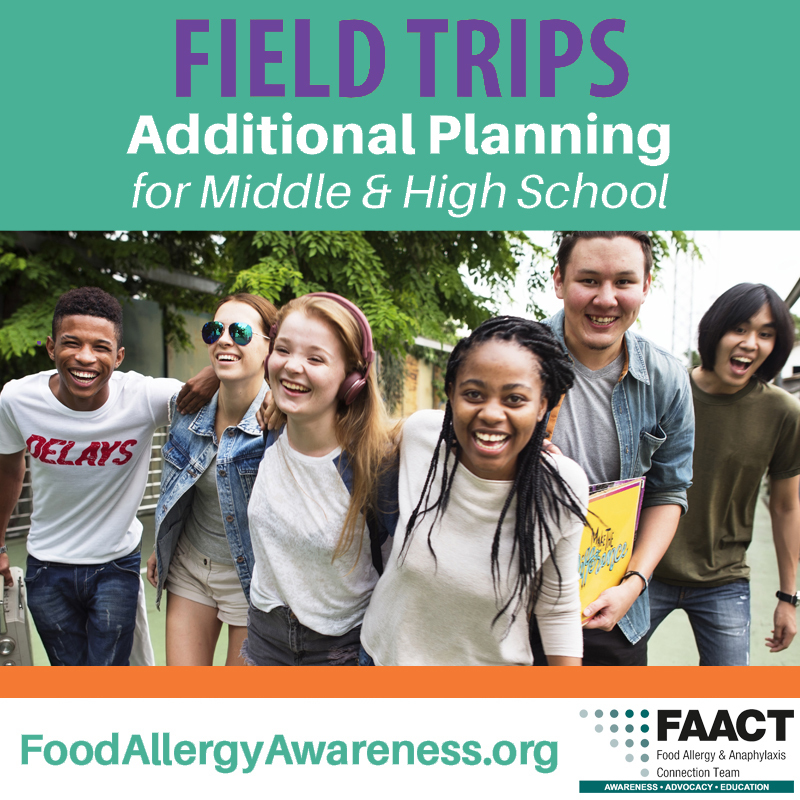
Additional Planning for Middle and High School
- Meet with parents individually to plan for each student’s needs while traveling.
- Have a plan for “check-in” among chaperones, coordinators, and students (when applicable) at designated times and immediately after snacks/meals. (Ensure a designated/trained individual meets with the group during meal and snack times.)
- Plan a group meeting with the student’s “buddy” (when using the “buddy system”) before the trip to review signs and symptoms of an allergic reaction and emergency procedures. Allow the student to share this information at his or her discretion – and if age appropriate – with an adult/parent/school nurse present.
When traveling by air, boat, or train, prepare in advance:
- Carry extra auto-injectors in their original packaging as backup.
- Ensure all names and prescription labels are attached to their original packaging.
- Keep liquid medication in the original containers, unopened.
- Keep a signed emergency action care plan and/or letter from the student’s doctor confirming the need for medication.
- Call ahead to speak with the concierge for cruises ships, airlines, and hotels to discuss dining alternatives to buffets and meals, as necessary; discuss meal planning during the student’s stay.
- Students should carry restaurant cards and notify a manager of their allergy upon arrival.
Prepare for emergencies:
- Locate health food and other allergy-friendly stores in the area.
- Locate pharmacies and hospitals.
- Carry and pack extra auto-injectors.
- Confirm travel arrangements in the event of an emergency.
- Carry doctor and other emergency contact numbers.
Resources and Downloads
- FAACT's Field Trips: Best Practices
- FAACT's Traveling with Food Allergies
- Food Allergy Safety: It's A Matter of FAACT!
- Food Allergy Management & Education (FAME) Toolkit
- Cleaning Methods
- Signs and Symptoms of Anaphylaxis
- More about Epinephrine
FAACTs
- Approximately 20 percent of cases requiring epinephrine administration in the school setting occurred outside the school building on the playground, traveling to and from the school, or on field trips.1
- Approximately 80 percent of severe allergic reactions requiring epinephrine among preschool children were left untreated. Factors resulting in under-treatment included lack of recognition of severity, epinephrine being unavailable, and fears about epinephrine administration.2
- 25 percent of first-time anaphylactic reactions reported in the school setting were those of students with no known history of an allergy.3,4
What is Anaphylaxis?
Anaphylaxis (an–a–fi–LAK–sis) is a serious allergic reaction that often involves swelling, hives, lowered blood pressure, and, in severe cases, shock. If anaphylactic shock isn\\'t treated immediately, it can be fatal.
References
1 Pediatrics. 2005 Nov;116 (5):1134-40., Administration of epinephrine for life-threatening allergic reactions in school settings., McIntyre CL, Sheetz AH, Carroll CR, Young MC.
2 American Academy of Pediatrics, Allergic Reactions to Foods in Preschool-Aged Children in a Prospective Observational Food Allergy Study, David M. Fleischer, MD, Tamara T. Perry, MD, and Scott H. Sicherer, MD.
3 Sicherer SH, Furlong TJ, DeSimone J, Sampson HA. The US Peanut and Tree Nut Allergy Registry: characteristics of reactions in schools and day care. J Pediatr. 2001;138(4):560–565
4 McIntyre CL, Sheetz AH, Carroll CR, Young MC. Administration of epinephrine for life-threatening allergic reactions in school settings. Pediatrics. 2005;116(5):1134–1140

